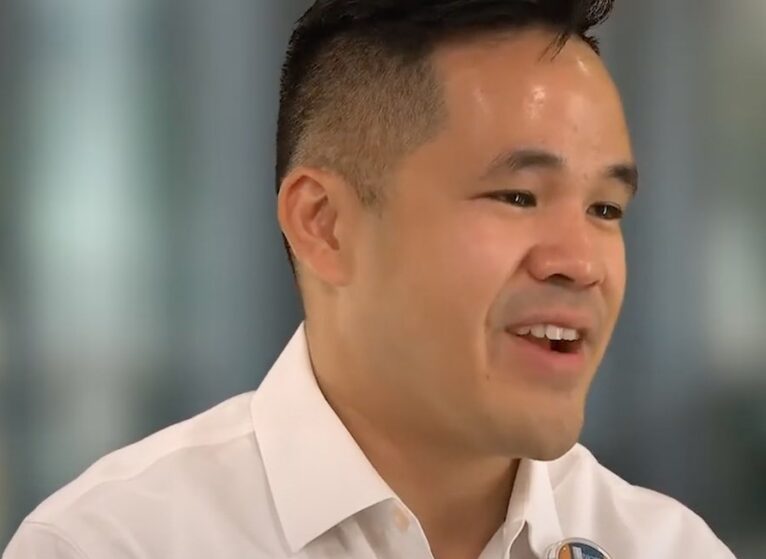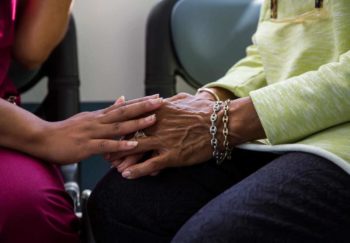Family medicine and psychologist Joseph Tan, PhD, cares for patients at our local family medicine clinics. His patients have a variety of mental health conditions:
He also sees transgender patients.
MEET A UVA PSYCHOLOGIST
We asked Tan to answer our 7 Quick Questions.
Why did you become a doctor?
I decided to become a clinical psychologist initially because of my interest in how people form and maintain relationships. I'm also interested in the impact relationships can have on life more broadly.
Becoming a psychologist gave me an opportunity to study relationships and put what I learned into practice in terms of helping people. I'm drawn to complex things. People's psychological experiences can be one of the most complex, difficult problems that someone can work on.
Why did you choose your specialty?
My specialty within clinical psychology is primary care behavioral health. I focus on integrating physical healthcare with behavioral healthcare. In this approach, behavioral health "consultants" are embedded in primary care clinics. This provides a low-barrier, often same-day, evidence-based behavioral health intervention as part of the primary care team.
I chose this specialty because I see it as a crucial part of what a better system for behavioral healthcare looks like in the future. It has the potential to normalize getting help for behavioral health problems. Plays a prevention role in strengthening behavioral health, and meet patients where they are already at in terms of receiving healthcare in a trusted setting.
What's one thing about your specialty that might surprise people?
That it exists! While primary care behavioral health is a growing field, most primary care clinics don't operate on that model. So it can be a surprise at some places that it's happening. Primary care behavioral health can also surprise people because it doesn't always look exactly like popular conceptions of therapy.
While I have a comfy couch in my office, I often see patients in the exam room as they're getting their physical healthcare. I work hand-in-hand with the rest of the primary care team to develop the behavioral health part of their treatment plan.
What's the most exciting thing happening in your field right now?
We're just scratching the surface of the primary care behavioral health model's potential. So there's a lot to look forward to.
Still, I'm most excited by the integration of primary care behavioral health into population health efforts nationwide. We know that physical health and behavioral health are deeply entwined with each other. Healthcare systems around the country are seeing primary care behavioral health as an important component of their efforts to improve health at a population level. They see the necessity of addressing behavioral health needs in order to adequately address physical health needs.
Where did you grow up?
I grew up in Wilmington, DE. Yes, I have a story about running into President Biden like every other Delawarean. And I went to college in Haverford, PA.
Who is your inspiration or hero?
I don't have one specific hero. My mentors have greatly influenced me throughout my training experience.
Mental & Physical Help
Our family medicine team provides both primary care and counseling.
Dr. Joseph Allen (UVA Psychology) was my research mentor during my PhD program. He bestowed a view of adolescence as a time of great social growth and development (as opposed to "storm and stress"). And helped me understand how the structures of our society don't give teens the best chance to grow sometimes.
Doctors Claudia Allen (UVA Family Medicine and who I get to work with still!) and Ted Siedlecki (my predecessor at UVA Family Medicine) shaped my approach to patient care. They taught me the values of being flexible and willing to take on challenges.
Dr. Sarah Hartley (Salem VA Medical Center) helped me understand the true potential and reach of primary care behavioral health and inspires me to work to grow this approach to care.
What's your favorite thing about working at UVA?
I love the people I work with, including staff, trainees, and fellow faculty! Being on a team and getting to interact regularly with people from different backgrounds and specialties. I learn every day from the people I work with, and it's a real privilege to get so much exposure to expertise outside of what I know.
My name is Joseph Tan. I'm a clinical psychologist in the Department of Family Medicine at UVA Health. I'll offer evidence-based treatments for depression, anxiety, and post-traumatic stress disorder, as well as brief interventions focused on the overlap between health and mental health. So, things like insomnia or other behavior changes like quitting smoking.
For patients coming to see their primary care provider, I will see them same day if there's something emergent, some sort of crisis going on, as well as if they're just interested in a brief strategy to kind of deal with anxiety or depression, something that they can kind of learn same-day without having to make another appointment to see another provider.
I think it's really important to me to get to understand the patient first. So I kind of want to know who you are, how you feel about being here today, what the lay of the land of your life looks like, because those things are really important in terms of forming a healing relationship within which we can do the work that we need to kind of help someone make some positive change in their life.



This question is directed to Dr. Tan, himself, so this may not be the appropriate place to ask this question?
Yesterday, I decided that I really do need to talk to somebody. I had thought that I would go through my employer’s EAP, to start with, but it is very interesting that I came across this article at just this time. Relationships is exactly what I need assistance with, along with some depression.
Dr. Tan, do you take on patients from outside your primary care setting?
Hi Dorothy,
I’m glad you’re making the decision to talk to somebody about relationships and depression. There is no “wrong door” when it comes to getting psychological support, so going through your employer’s EAP is a good idea, and you can also contact our clinic at 434-243-6868 if you’d like help thinking about other ideas for getting help.
Dr. Tan